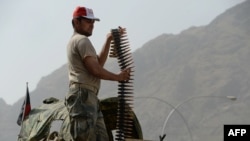Pakistan and Afghanistan agreed late on Wednesday to observe a cease-fire after days of deadly border skirmishes that left four soldiers dead and wounded more than 40 people, including civilians, on both sides.
Afghan and Pakistani security forces from both sides are said to have raised white flags, a common means to show surrender. The clashes occurred at the busy Torkham border crossing.
“It has been agreed but hope it holds,” Hazrat Omer Zakhilwal, Afghan ambassador to Islamabad, told VOA when it was announced a cease-fire has been agreed to. He shared no other details.
Zakhilwal made the statement shortly after holding separating meetings with Pakistani military chief General Raheel Sharif and top foreign ministry officials.
Earlier, Pakistan military spokesman Lt. General Asim Bajaw told reporters that both sides had made contact on diplomatic, political and military levels to de-escalate the border clashes.
Trying to limit damages
Bajaw noted Pakistan does not want to prolong the conflict because it would only cause more devastation and hurt mutual interests of neighboring countries.
In Kabul Wednesday, the Afghan parliament also passed a resolution, calling for resolving the conflict with Pakistan through diplomatic and political means.
The most frequented Torkham crossing has remained closed since the conflict began, stranding thousands of travelers on both sides and halting trade conveys.
Afghanistan and Pakistan blame each other for starting the skirmishes.
Bajwa reiterated Afghan forces began “unprovoked” firing late last Sunday to disrupt construction of a gate by Pakistan at the Torkham crossing. He dismissed allegations the gate is located in the disputed territory and insisted the new facility being built 37 meters inside Pakistani territory would help prevent terrorist and other illegal movements on either side.
“This border management system is going to benefit Afghans equally well. This is good for both the countries. This will check all kind of movement on either side of the border, so this blame game will eventually end. I think this is going to help all of us and we should get there,” he told a news conference in Rawalpindi, where the military is headquartered.
Construction
Bajwa added that Pakistan plans to construct similar structures at all the eight established border crossings with Afghanistan to address mutual allegations and concerns that militants involved in subversive activities in both countries freely move across the nearly 2,600-kilometer-long so-called Durand Line.
He said that militant incursions from across the Torkham crossing led to some of the deadliest terrorist attacks in Pakistan in recent years.
The Afghan government, which denounced the construction of the gate, has defended military retaliation, saying no new facility could be erected at the border without mutual consent.
The objection stems from historic Afghan disagreement with a frontier that was drawn by former British rulers of the Indian subcontinent.




